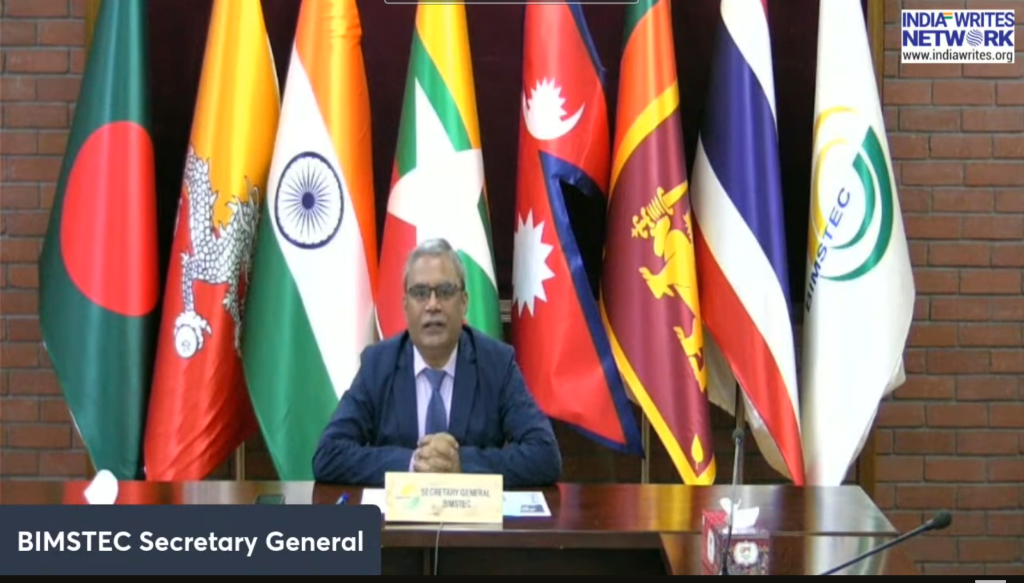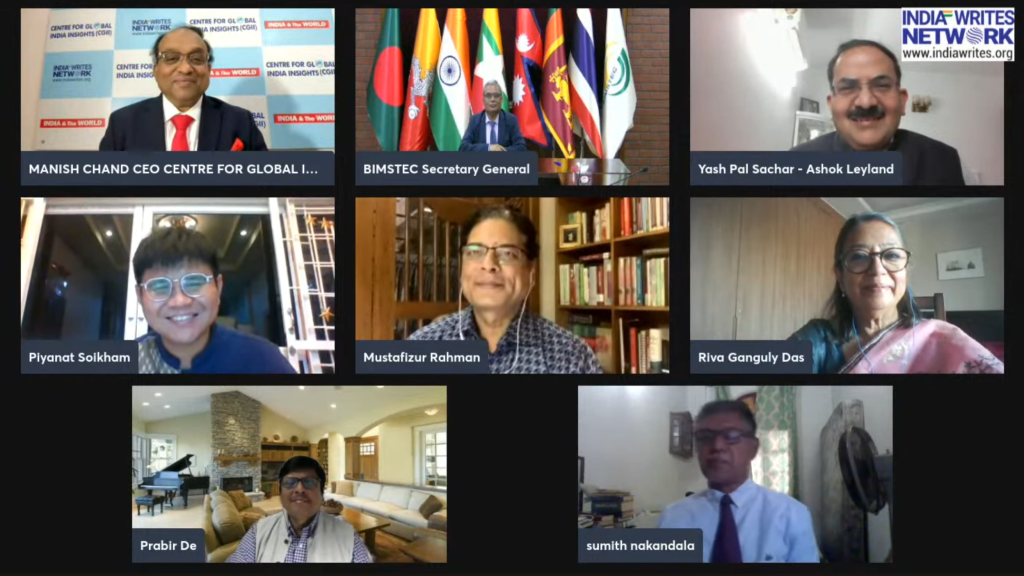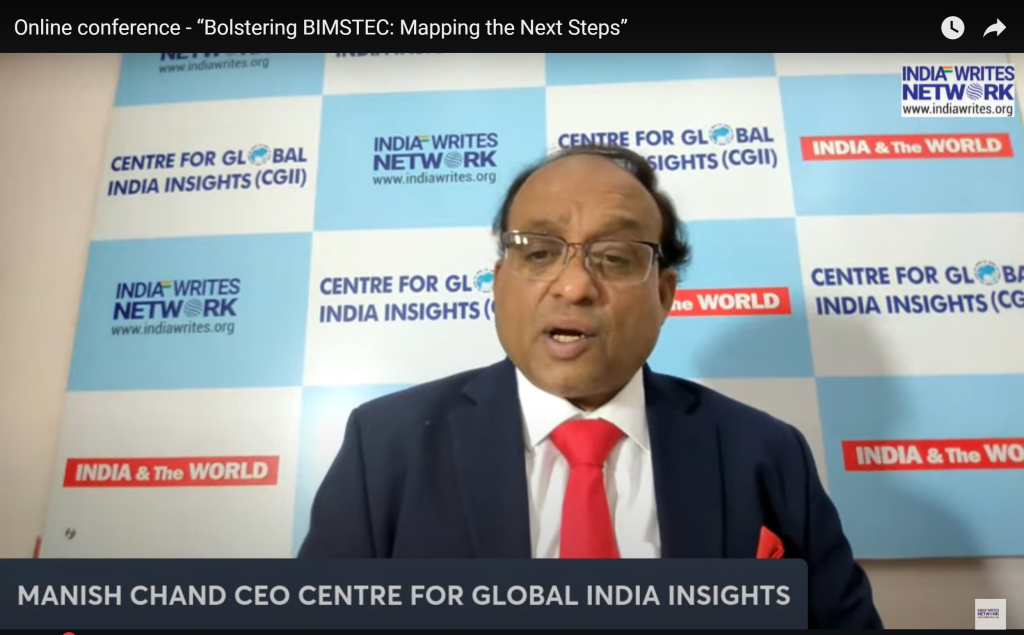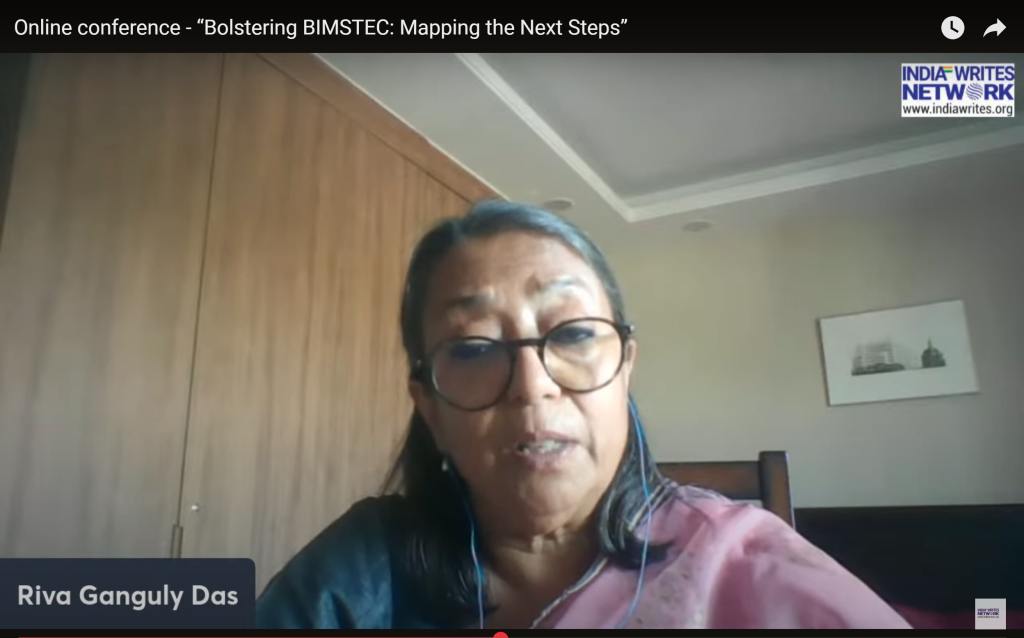 Ahead of the BIMSTEC summit and Prime Minister Narendra Modi’s visit to Thailand next week, BIMSTEC Secretary General Indra Mani Pandey has stressed on intensifying counter-terror cooperation and underlined that the grouping will acquire more economic and strategic heft with the adoption of the Bangkok Vision 2030.
Ahead of the BIMSTEC summit and Prime Minister Narendra Modi’s visit to Thailand next week, BIMSTEC Secretary General Indra Mani Pandey has stressed on intensifying counter-terror cooperation and underlined that the grouping will acquire more economic and strategic heft with the adoption of the Bangkok Vision 2030.
In an online conference organised by Centre for Global India Insights (CGII), a think tank focused on global affairs and India Writes Network, Mr Pandey highlighted ongoing initiatives to bolster security cooperation, including counter-terrorism, among BIMSTEC member states.
“We have robust cooperation in security sector. There is greater focus on dealing with the shared challenge of counterterrorism, and issues like drug trafficking, and human trafficking in the region,” said Mr Pandey. “A convention on counterterrorism and drug trafficking is already in force. Member states have been working together in implementing that convention and there are mechanisms in place for them to work together,” he said.
 The conference, titled “Bolstering BIMSTEC: Mapping the Next Steps,” was held ahead of Prime Minister Narendra Modi’s visit to Bangkok to attend BIMSTEC summit and featured eminent diplomats and experts from India, Thailand Sri Lanka and Bangladesh. Diplomats from other BIMSTEC countries also attended the conference.
The conference, titled “Bolstering BIMSTEC: Mapping the Next Steps,” was held ahead of Prime Minister Narendra Modi’s visit to Bangkok to attend BIMSTEC summit and featured eminent diplomats and experts from India, Thailand Sri Lanka and Bangladesh. Diplomats from other BIMSTEC countries also attended the conference.
Besides BIMSTEC Secretary General Pandey, Sumith Nakandala, First Secretary General, BIMSTEC Secretariat; Amb. (Retd.) Riva Ganguly Das, India’s Former High Commissioner to Bangladesh; Prof Mustafizur Rahman, Distinguished Fellow, Centre for Policy Dialogue (CPD), Dhaka; Dr. Piyanat Soikham, Director, India Studies Centre, Ubon Ratchathani University, Thailand; Prabir De, Professor, RIS; and Yash Pal Sachar, Vice-President, Ashok Leyland participated in the panel discussion. The conference was moderated by Manish Chand, CEO, Centre for Global India Insights.
“Our leaders will adopt a joint declaration. They will also adopt a BIMSTEC Bangkok Vision 2030. This is for the first time that BIMSTEC will adopt its own vision document,” said Mr Pandey. “There will be signing of agreement on maritime transport cooperation in the presence of our leaders. A number of other MoU will be signed for partnerships between BIMSTEC Secretariat and its external partners,” he said.
The BIMSTEC chief also underlined the importance of the grouping for promoting South-South Cooperation. “The best way to engage in South-South Cooperation, in my view, is through mini-laterals and regional organizations like BIMSTEC. BIMSTEC continues to enjoy full political support of all its members,” he said.
“In In this age of competing nationalisms, crises and conflicts, BIMSTEC can emerge as a catalyst for accelerating regional integration,” said Mr Chand, CEO, CGII, while placing the importance of BIMSTEC in a changing reginal and international landscape. “There is a lot of optimism and confidence about the future of the grouping. Enhancing people-to-people contacts and cultural linkages will impart a greater popular resonance to the group- grouping,” he said. In the changed geopolitical context, BIMSTEC can become the preferred platform for accelerating regional integration and interlinking South Asia and Southeast Asia, he said.
Partnering with ASEAN, IORA
Alluding to ongoing efforts by BIMSTEC to forge partnerships with international and regional organizations, Mr Pandey said that the seven-nation grouping will sign an MOU with Indian Ocean Rim Association at the summit in Bangkok. “We are in close conversation with ASEAN. It’s an organization which is keen to work together with BIMSTEC because two members of ASEAN are members of BIMSTEC, Thailand and Myanmar. And there is a lot that we can learn from experience of ASEAN,” he said.
Don’t Compare BIMSTEC & SAARC
Eminent panellists at the conference also cautioned against comparing and looking at BIMSTEC through the prism of other regional groupings such as SAARC and ASEAN. “It is not fair to BIMSTEC, to look at BIMSTEC in the context of SAARC or any other organization because BIMSTEC has its own rationale, its own agenda, its own role, its own history,” said Mr Pandey. “It has its own challenges and opportunities as a regional organization. We were born 27 years ago. At that time, SAARC was fully functional and at the same time, the need was felt to have an organization which will focus on technical and economic cooperation bringing together countries from South Asia and Southeast Asia.”
“SAARC is regional, confined to South Asia, whereas BIMSTEC has the advantage of linking two crucial regions — South Asia and Southeast Asia,” said Amb. (Retd.) Riva Ganguly Das, former secretary (East) in India’s Ministry of External Affairs. “There is often a power asymmetry in SAARC, leading to suspicion among smaller countries, but BIMSTEC does not face this issue to the same extent because both India and Thailand provide balance,” she said.
In a similar vein, Amb. Sumith Nakandala, BIMSTEC’s first Secretary General, said: “Comparisons between BIMSTEC and other regional organizations, like ASEAN, are not valid. We have our own history, our own challenges, and our own trajectory.”
Amb. Ganguly also highlighted BIMSTEC’s role in enhancing security and counter-terror cooperation in the region. “Security is a critical sector for BIMSTEC, particularly in dealing with terrorism, transnational crimes, and non-traditional security threats.”
Prabir De, professor, RIS, highlighted the pivotal role of BIMSTEC, in accelerating connectivity and distinguished BIMSTEC’s approach from China’s Belt and Road Initiative. “It is not a top-down, it’s a bottom-up kind of thing. Belt and Road Initiatives follow a bottom-up approach,” said Prof. De, while cautioning against debt trap associated with many BRI projects.
Author Profile
- India Writes Network (www.indiawrites.org) is an emerging think tank and a media-publishing company focused on international affairs & the India Story. Centre for Global India Insights is the research arm of India Writes Network. To subscribe to India and the World, write to editor@indiawrites.org. A venture of TGII Media Private Limited, a leading media, publishing and consultancy company, IWN has carved a niche for balanced and exhaustive reporting and analysis of international affairs. Eminent personalities, politicians, diplomats, authors, strategy gurus and news-makers have contributed to India Writes Network, as also “India and the World,” a magazine focused on global affairs.
Latest entries
 DiplomacyJanuary 5, 2026India walks diplomatic tightrope over US operation in Venezuela
DiplomacyJanuary 5, 2026India walks diplomatic tightrope over US operation in Venezuela India and the WorldNovember 26, 2025G20@20: Africa’s Moment – The Once and Future World Order
India and the WorldNovember 26, 2025G20@20: Africa’s Moment – The Once and Future World Order DiplomacyOctober 4, 2025UNGA Resolution 2758 Must Not Be Distorted, One-China Principle Brooks No Challenge
DiplomacyOctober 4, 2025UNGA Resolution 2758 Must Not Be Distorted, One-China Principle Brooks No Challenge India and the WorldJuly 26, 2025MPs, diplomats laud Operation Sindoor, call for national unity to combat Pakistan-sponsored terror
India and the WorldJuly 26, 2025MPs, diplomats laud Operation Sindoor, call for national unity to combat Pakistan-sponsored terror

 “In In this age of competing nationalisms, crises and conflicts, BIMSTEC can emerge as a catalyst for accelerating regional integration,” said Mr Chand, CEO, CGII, while placing the importance of BIMSTEC in a changing reginal and international landscape. “There is a lot of optimism and confidence about the future of the grouping. Enhancing people-to-people contacts and cultural linkages will impart a greater popular resonance to the group- grouping,” he said. In the changed geopolitical context, BIMSTEC can become the preferred platform for accelerating regional integration and interlinking South Asia and Southeast Asia, he said.
“In In this age of competing nationalisms, crises and conflicts, BIMSTEC can emerge as a catalyst for accelerating regional integration,” said Mr Chand, CEO, CGII, while placing the importance of BIMSTEC in a changing reginal and international landscape. “There is a lot of optimism and confidence about the future of the grouping. Enhancing people-to-people contacts and cultural linkages will impart a greater popular resonance to the group- grouping,” he said. In the changed geopolitical context, BIMSTEC can become the preferred platform for accelerating regional integration and interlinking South Asia and Southeast Asia, he said. “SAARC is regional, confined to South Asia, whereas BIMSTEC has the advantage of linking two crucial regions — South Asia and Southeast Asia,” said Amb. (Retd.) Riva Ganguly Das, former secretary (East) in India’s Ministry of External Affairs. “There is often a power asymmetry in SAARC, leading to suspicion among smaller countries, but BIMSTEC does not face this issue to the same extent because both India and Thailand provide balance,” she said.
“SAARC is regional, confined to South Asia, whereas BIMSTEC has the advantage of linking two crucial regions — South Asia and Southeast Asia,” said Amb. (Retd.) Riva Ganguly Das, former secretary (East) in India’s Ministry of External Affairs. “There is often a power asymmetry in SAARC, leading to suspicion among smaller countries, but BIMSTEC does not face this issue to the same extent because both India and Thailand provide balance,” she said.





